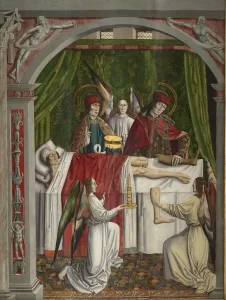Words on the Word
Proof in the Pudding
This brief homily was given at the opening of an ecumenical symposium held at the Archabbey of Pannonhalma. The Gospel at Mass was Luke 9:18-22 in which Christ asks, first, ‘Who do the crowds say that I am?’, then, ‘Who do you say that I am?’ By the liturgical calendar we kept the feast of Sts Cosmas and Damian.
Saints Cosmas and Damian were blood brothers who practised medicine. They are known in the tradition as Ἀνάργυροι, ‘silverless ones’. They treated the poor without exacting payment. Such behaviour made enemies then as now: it brought prices down in the profession. The brothers’ choice to place Christian charity before their career will have played its part in provoking their martyrdom somewhere in Syria during the reign of Diocletian.
In the Gospel Christ asks: ‘Who do you say that I am?’ The question is timeless. As professing Christians — as monks under vows, ministers, teachers of theology — we have sophisticated answers ready to come tripping off our tongue. The example of the saints reminds us, though, that the genuine answer to this vital question (in comparison with which all others fade into insignificance), is that of testimony, of a life coherently lived.
Does faith in Christ as God define my existence? Does it make me put nothing, nothing at all, before his love? Do I, on account of it, accept my share in his rejection, his self-emptying unto death, in order to know the liberating joy of his rising?
Let us serenely but sternly examine ourselves in this regard and reaffirm the Yes! we gave once with conviction. Let us let Christ’s Spirit blow on the flame of our good zeal. For these are the terms on which his kingdom will come, conquering our divisions, cowardice, conceit, and foolishness, enabling us, by grace, to become in Illo Uno unum.

Saints Cosmas and Damian performing a miraculous cure by transplantation of a leg. Oil painting attributed to the Master of Los Balbases, ca. 1495. In the Wellcome Collection.
